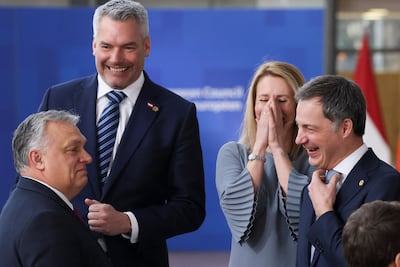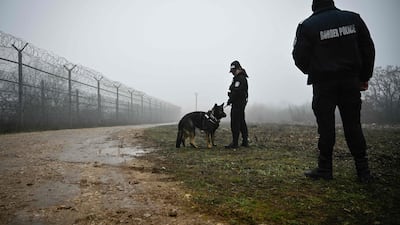EU leaders agreed to fortify the bloc's borders against immigration early on Friday, bowing to pressure from Austria and others who have complained of a surge in asylum claims.
Under a pilot project, cameras, guard towers and road patrols are to be set up on the border between Turkey and bloc member state Bulgaria, paid for with EU money.
The EU is promising to step up deportations, with countries urged to make a common list of "safe countries" whose citizens can swiftly be denied asylum.
Leaders also backed the principle of stationing more EU border guards outside the bloc and using visa rules to pressure third countries that fail to co-operate on deportations.
The decisions were being drafted before the disastrous earthquake in Turkey and Syria. In Britain, a Downing Street spokesman said there were safe and legal routes for survivors to seek to emigrate.
The EU clampdown, despite unease in Brussels about creating a "Fortress Europe", is a partial victory for Austria after it vetoed Romania and Bulgaria's membership of the visa-free Schengen zone to press its claims.
It had argued that 75,000 unregistered migrants should not have been able to reach landlocked Austria, suggesting the EU's external borders were weak, but its hardball stance dismayed allies.
However, Austrian Chancellor Karl Nehammer on Friday said the pressure campaign had worked as even sceptical countries came on board, on a subject that is invariably a diplomatic minefield in Brussels.
A nine-point statement was agreed on in the early hours of Friday at a special summit, at which Ukraine's President Volodymyr Zelenskyy had earlier addressed EU leaders.
European Commission President Ursula von der Leyen said the EU would fund "an integrated package of mobile and stationary infrastructure" in Bulgaria — "from cars to cameras, from watchtowers to electronic surveillance".

"Our pressure paid off," Mr Nehammer said. "Countries on the EU external border will be supported. The EU is moving to a higher gear in the fight against illegal migration.
"These are concrete results and clear words. Now it is a matter of turning words into actions. Austria will be keeping a close eye and pressing for it to happen."
The commission draws a red line at paying for walls and barbed wire as EU borders — but Mr Nehammer said the money was needed "no matter if you call it a fence or border infrastructure".
Austria also pointed out that although the EU will not pay directly for border walls, the funding could free up money for national governments such as Bulgaria's to pay for fences.
Still, not all Austria's demands were met. In a letter to the commission last year, it had called for a new "rapid rejection directive" for people from safe countries, and revoking asylum from serious criminals.
On the first point, leaders called for countries to "speed up return procedures" — EU jargon for deportations — by recognising each other's decisions on who was ineligible.
Ms von der Leyen had said before the summit that the EU "has to get better" at returns because only 70,000 people are typically deported out of a possible 300,000 a year.
But there was no mention of a new directive in Friday's text, besides a wide-ranging asylum pact that has been held up in Brussels horse-trading for years, nor of deporting criminals.

One policy on the table is lobbying nearby countries to follow the EU's visa policy, after lax rules in Serbia were blamed for an influx of Indians and Tunisians in Austria.
The 27 leaders called for "rapid conclusion of negotiations" on stationing EU border police in other countries, closer to the source of migration. At present they can only work at EU-facing borders.
Central EU funding should also be used to "support member states in reinforcing border protection capabilities and infrastructure, means of surveillance, including aerial surveillance, and equipment," leaders said.
Luxembourg's Prime Minister Xavier Bettel opposed taking this as far as border fences, which he said recalled Europe's divisions of the past.
"For the moment what is on the table is Bulgaria-Turkey. But this will not be enough," he said. "So there will be again new fences and again new walls ... is the conclusion that we want a fortress in Europe?"
The EU's foreign affairs and security chief Josep Borrell cautioned against tightening rules too far, saying "Fortress Europe" was not the answer.
"People move because in their countries there is not a future, there is no peace, there is no stability," he said.
Belgium said the situation amounted to "a major migration crisis", while the Netherlands spoke in favour of restricting visas and aid to countries failing to co-operate.


